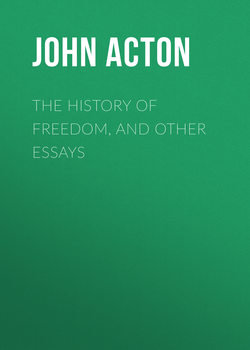The History of Freedom, and Other Essays

Реклама. ООО «ЛитРес», ИНН: 7719571260.
Оглавление
Acton John Emerich Edward Dalberg Acton Baron. The History of Freedom, and Other Essays
PREFATORY NOTE
CHRONICLE
INTRODUCTION
I. THE HISTORY OF FREEDOM IN ANTIQUITY2
II. THE HISTORY OF FREEDOM IN CHRISTIANITY3
III. SIR ERSKINE MAY'S DEMOCRACY IN EUROPE5
IV. THE MASSACRE OF ST. BARTHOLOMEW6
V. THE PROTESTANT THEORY OF PERSECUTION192
VI. POLITICAL THOUGHTS ON THE CHURCH299
VII. INTRODUCTION TO L.A. BURD'S EDITION OF IL PRINCIPE BY MACHIAVELLI
VIII. MR. GOLDWIN SMITH'S IRISH HISTORY321
IX. NATIONALITY325
X. DÖLLINGER ON THE TEMPORAL POWER333
XI. DÖLLINGER'S HISTORICAL WORK337
XII. CARDINAL WISEMAN AND THE HOME AND FOREIGN REVIEW338
XIII. CONFLICTS WITH ROME339
XIV. THE VATICAN COUNCIL369
XV. A HISTORY OF THE INQUISITION OF THE MIDDLE AGES
XVI. THE AMERICAN COMMONWEALTH
XVII. HISTORICAL PHILOSOPHY IN FRANCE AND FRENCH BELGIUM AND SWITZERLAND
APPENDIX
Отрывок из книги
John Emerich Edward Dalberg-Acton, born at Naples, 10th January 1834, son of Sir Ferdinand Richard Edward Dalberg-Acton and Marie de Dalberg, afterwards Countess Granville.
A few instances may be given. In criticising a professor of history famous in every way rather than as a student, Acton says, "his Lectures are indeed not entirely unhistorical, for he has borrowed quite discriminatingly from Tocqueville." Of another writer he says that "ideas, if they occur to him, he rejects like temptations to sin." Of Ranke, thinking perhaps also of himself, he declares that "his intimate knowledge of all the contemporary history of Europe is a merit not suited to his insular readers." Of a partisan French writer under Louis Napoleon he says that "he will have a fair grievance if he fails to obtain from a discriminating government some acknowledgment of the services which mere historical science will find it hard to appreciate." Of Laurent he says, that "sometimes it even happens that his information is not second-hand, and there are some original authorities with which he is evidently familiar. The ardour of his opinions, so different from those which have usually distorted history, gives an interest even to his grossest errors. Mr. Buckle, if he had been able to distinguish a good book from a bad one, would have been a tolerable imitation of M. Laurent." Perhaps, however, the most characteristic of these forgotten judgments is the description of Lord Liverpool and the class which supported him. Not even Disraeli painting the leader of that party which he was destined so strangely to "educate" could equal the austere and accurate irony with which Acton, writing as a student, not as a novelist, sums up the characteristics of the class of his birth.
.....
What Acton feared and hated was the claim of absolutism to crush the individuality and destroy the conscience of men. It was indifferent to him whether this claim was exercised by Church or State, by Pope or Council, or King or Parliament. He felt, however, that it was more dangerous because more absorbing when exercised in religious matters, and thus condemned the Protestant theory more deeply than the Catholic permission of persecution. He also felt that monarchy was more easily checked than pure democracy, and that the risk of tyranny was greater in the latter.
Provided that freedom was left to men to do their duty, Acton was not greatly careful of mere rights. He had no belief in the natural equality of men, and no dislike of the subordination of classes on the score of birth. His ideal of freedom as of the Church was in some respects that of the earlier Middle Ages. He did not object to serfdom, provided that it safeguarded the elementary rights of the serf to serve God as well as man. In the great struggle in America, he had no sympathy with the North, which seemed to him to make majority rule the only measure of right: and he wrote, if not in favour, at least in palliation, of slavery. It may be doubted how far he would have used the same language in later life, but his reasons were in accord with all his general views. Slavery might be rendered harmless by the State, and some form of compulsion might be the only way of dealing with child-races, indeed, it might be merely a form of education no more morally blameworthy than the legal disabilities of minors. But the absolute state recognising no limits but its own will, and bound by no rule either of human or Divine law, appeared to him definitely immoral.
.....